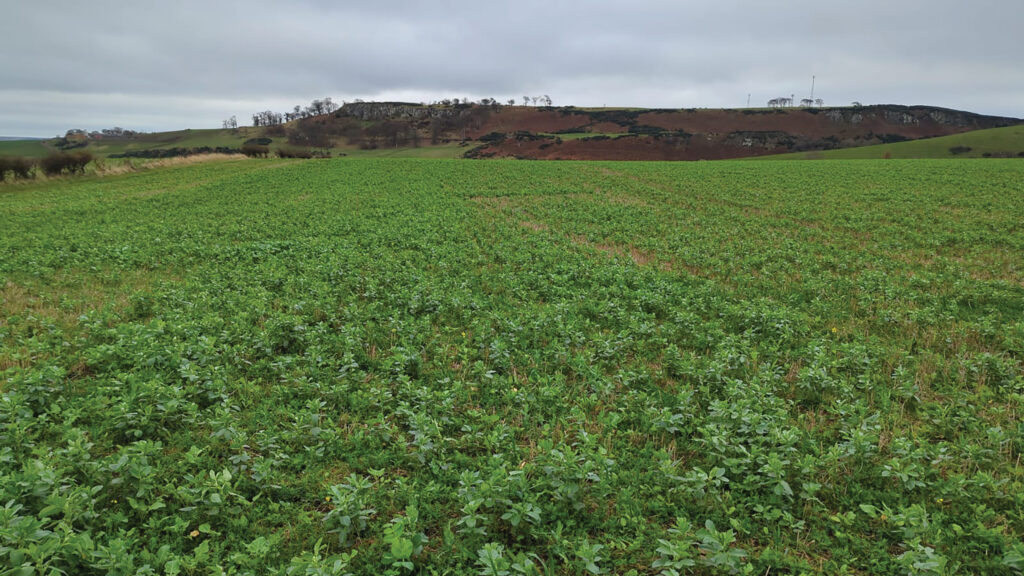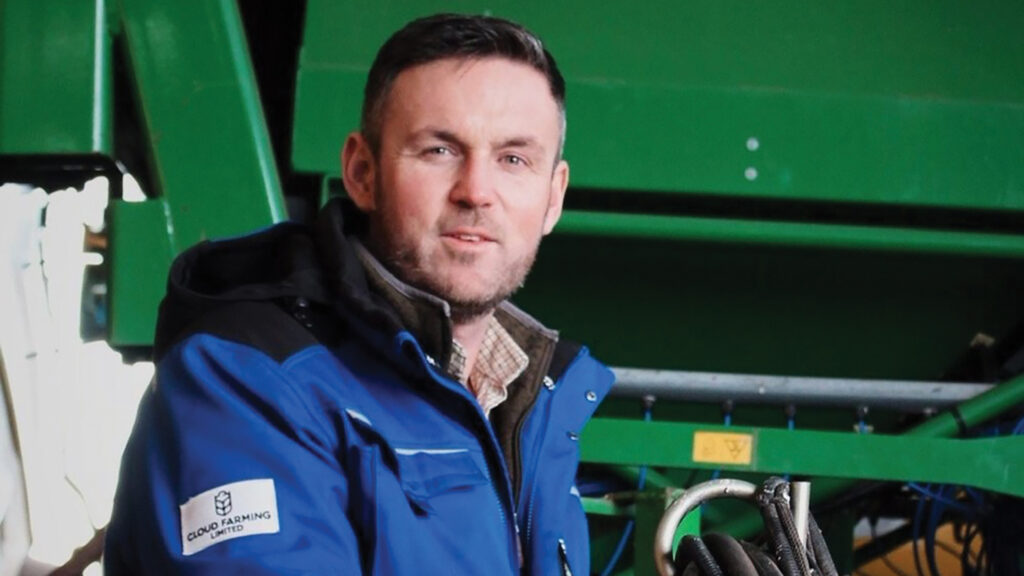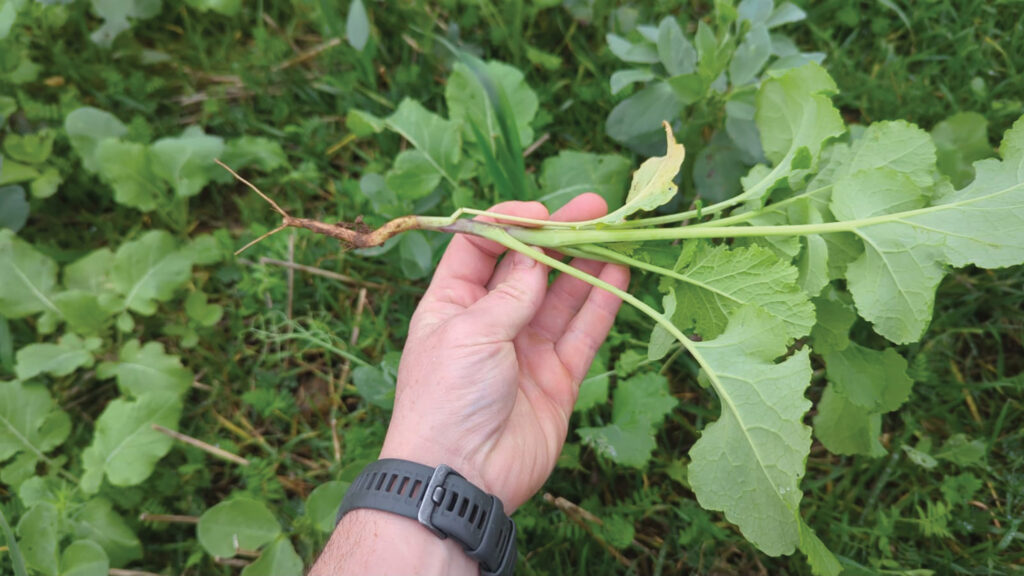Why Scottish regen farming business added beans to rotation
 © Chris Leslie
© Chris Leslie A contract farming business bringing regenerative agriculture techniques to farms in Scotland has introduced beans into its rotations to improve soil health.
Chris Leslie and his business partner James Hopkinson founded Cloud Farming in 2018 with a focus on regenerative farming solutions and good soil management.
“For the first 20 years of my career I was very conventional, but I have been using regenerative practices since the first Groundswell in 2016,” explains Chris, who is Basis and Fact qualified, and a chartered environmentalist.
“I realised that we can only push fungicides so far, and it’s not the way forward.”
See also: 9 farmer trials that aim to promote UK pulse production
A year ago, Chris started growing 60ha of beans following a trip to France to look at different farms and production systems.
“I started to realise just how important legumes are in soil regeneration, so I came away with an idea of using beans as a cover crop,” he says.
“The first stage of regenerating soils is using legumes to feed the mycorrhiza fungi; I think there’s no other way to do it, you can’t apply your way to organic matter or carbon.”
The beans also increase nitrogen in the soil ahead of spring crops, thereby reducing the need for nitrogen fertiliser.
“I would say we get around 30kg/ha of nitrogen through the beans, although French research suggests it’s over 100kg by putting in beans over winter ahead of a spring crop. But because we’re harvesting the beans, we’re losing a little bit.”
In addition to the beans, the cover crop mix includes vetch, peas and mustard.
Chris notes the mustard variety is critical as the Ethiopian type has large leaves which provides good ground cover.
He only applies calcium to the cover crop, which he then flails and mulches.

Chris Leslie © Chris Leslie
Bean varieties
- Spring beans (Lynx) as part of a legume cover crop
- Winter beans (Honey or Wizard) companion cropped with Crusoe milling wheat
- Spring bean (Lynx) cash crops.
Adapted drill
In order to sow vetch and beans together, Chris bought a second-hand drill and had it adapted to a twin hopper.
“In some parts we’re mulching them to increase nitrogen, in others we’re just growing beans as a crop,” he says.
“We’re into our second year of growing them now, and we’re also companion cropping wheat and beans.”
The beans have had a positive impact on biodiversity, as well as the soil.
“We took on a contract farm on the Drum Estate in Edinburgh and planted the beans; one of the first comments from the gamekeeper and owner was that they couldn’t believe the bird life and the bees,” he adds.
Once harvested, the beans go to Roger Baird at Pulse Processing, based at Coastal Grains near Belford, Northumberland, where they are de-hulled for fish, animal or human food.
Last year, the beans yielded well at 6.4t/ha but this harvest (2024), they yielded less at 4.8t/ha due to the late spring, not being drilled until late April.
Chris left the bean stubble over winter and it created a perfect seed-bed.
“When we came to drilling in the spring, we put it straight into oats and the structure was perfect – it just shows what the beans can do.”
The beans could also bring benefits to more than just spring crops.
“It’s been well documented across the world that drilling beans in potato tramlines and headlands to encase the potatoes produces a better crop – what they do for the soil and the pollinators is incredible, particularly aphid control.”
Cover crops have been a popular option under the Sustainable Farming Incentive scheme, which many in England have taken up.
“The government has played a blinder,” says Chris. “For those that have selected that option, it’s given another 50 years to farming in England.”

© Chris Leslie
Faba bean processing
Roger Baird, director at Pulse Processing, has been trading faba beans for 25 years in Scotland, selling primarily to Egypt in North Africa.
“We produce 750,000t of faba beans in the UK, and now we’re starting to see real health and sustainability benefits,” he says.
“They’re naturally gluten-free, and due to their low glycaemic properties, are good for gut health, too. The flour is popular as an improver alongside wheat flour for bread making in France.”
De-hulling is the process of separating the faba bean kernels from the hulls.
“We remove around 99% of the hulls, which allows for a secondary process, meaning we can produce starch and protein concentrate – making it a good feed option for livestock and a viable alternative to soya.”
Beans have been undervalued for years, he says. “They contain up to two and a half times the protein content of wheat, which is not reflected in their price.
“And this value hasn’t been able to be redeemed commercially, because the de-hulling technology hasn’t been efficient enough; until now.”
Today’s technology means it is feasible for farmers to grow beans as companion crops.
“Being able to grow more than one crop in a field is the holy grail of regenerative agriculture,” says Roger.
“And we have a multigrain separator which can separate five different species of crops in one pass – it’s a game changer.”
“If farmers are able to grow multiple crops all with a different objective – fixing nitrogen, sequestering carbon, deep rooting legumes and brassicas – inputs and emissions will decrease.
“There’s 70,000t of free nitrogen above every hectare of land and ocean across the world, so beans are pulling in nitrogen from that – a good crop is carbon negative.”
The plant is currently processing 1,000t of faba beans a month.
“The hope is that as other routes to market open up, like human and pet foods, and we will quickly require bigger premises to meet demand,” he adds.
The future for faba beans is bright, as consumers and retailers are looking for low-carbon products, and Roger hopes his technology will play a part in that happening on a commercial scale.
“We hope to make our separation technology available to Chris and other regenerative farmers soon.”

